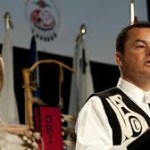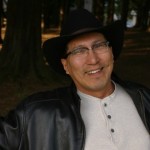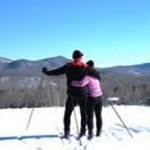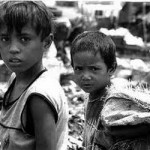Court adds 600,000 Indians to government responsibilities.
by Richard Wagamese
The Federal Court decision recognizing that Métis and non-status Indians in Canada are “Indians” under the Constitution Act had a lot of non-native Canadians scratching their heads. The question the ruling raised most was: What does it mean to be Indian in Canada today?
It’s a heady question, that will spark much debate and a likely appeal of that decision by the Harper government. The ruling could mean that Métis and non-status Indians are entitled to the same benefits as registered status Indians. Those benefits include some tax exemptions if living on a reserve, hunting and fishing rights, and some health and education benefits.
The new “Indians” inherit the same struggles, frustrations and denials their status brothers and sisters have endured for some 140 years.
But the issue is deeper than that, and goes way beyond a mere political grab bag of rights. It goes to the fundamental idea of Canada itself because, if the ruling stands, there will be 600,000 more Indians for the federal government to deal with. It means that the new “Indians” inherit the same struggles, frustrations and denials their status brothers and sisters have endured for some 140 years.
To be Indian in Canada today means that one signatory (to the nation-to-nation agreement that frames your life) forgets that it’s a treaty nation. Canada became a treaty nation when it sought to bring the Indians into treaty. It entrenched itself historically when it signed those documents. Unfortunately, the years since have been an ongoing process of denial of obligations and responsibilities under treaty.
To be Indian in Canada today is to see your children suffer. On reserves, in Métis communities and in the cities, aboriginal children go hungry, lack warm clothing and solid educational resources, die as infants at a rate two to four times the national average and endure immunization rates 20 times lower than the general population. They suffer because different orders of government dispute who’s responsible to pay or provide for a service.
To be Indian in Canada today is to see youth languish in chronic unemployment and malaise, and high rates of alcohol, drug and solvent abuse and suicide.
To be Indian in Canada today is to see youth languish in chronic unemployment and malaise, endure high rates of alcohol, drug and solvent abuse or die by suicide at a rate five to seven times higher than non-aboriginal youth. It is to see the future of your people fail to finish high school or get skills training; too often they become parents themselves at a frighteningly early age. This, despite Canada’s being a signatory to the United Nations Convention on the Rights of the Child.
To be Indian in Canada today is to know that your women are likely to be victimized, murdered or go missing. It’s to know that you may have to share a two-bedroom house with as many as 16 other people. It’s the understanding that running water is a luxury or clean drinking water a rarity. It’s the awareness that Canada has known about these grave issues for decades, but they still persist.
To be Indian in Canada today is to know that your people’s part in the history of Canada isn’t taught in schools. It’s to know that, when we speak of our treaty rights, most of the country doesn’t know what we speak of. It’s to hear your spiritual connection to the land referred to as nothing but a “romanticized attachment” by educated journalists. It’s to have your traditional role as a steward and protector of the land denounced summarily.
This is the reality that greets Canada’s new “Indians.” But there’s more. To be Indian in Canada today is to stand in solidarity and equality with brothers and sisters across the country to say that we won’t live this way any longer. It’s to be part of a movement of people that says we won’t idle any longer or wait for our chiefs to tell us when or where to move. It’s to seek to enlighten our non-native neighbours to the truth of who we are, our history, rights and what we want.
To be Indian in Canada is also to be part of a movement of people that says we won’t idle any longer or wait for our chiefs to tell us when or where to move.
To be Indian in Canada today is to watch our youth and our women take to the forefront of this direct action and lead. It’s to know that our future is secure so long as they continue to bring their energy and their vision to the attention of a nation that has never truly heard us before. It’s to be galvanized. It’s to be strong.
To be Indian in Canada today is to learn from history so it’s never repeated. It’s to turn to our elders and wise ones for guidance in turbulent times. It’s to be prayerful and gentle at the same time we are resolute and unwavering. It’s to be a spiritual warrior in a quest for the greatest good.
This is what awaits the new “Indians.” I say welcome.

 Richard Wagamese is the author of seven titles with major Canadian publishers. He is also a Native American or, as we say in Canada, a First Nations person from the Ojibwa nation. His home territory is a place called Wabaseemoong in northwest Ontario, near the Manitoba border. He has been writing professionally since 1979 in newspapers, radio, television and books.
Look for these books by Richard Wagamese One Story, One Song and the new novel Indian Horse both from from Douglas & McIntyre,.
Richard Wagamese is the author of seven titles with major Canadian publishers. He is also a Native American or, as we say in Canada, a First Nations person from the Ojibwa nation. His home territory is a place called Wabaseemoong in northwest Ontario, near the Manitoba border. He has been writing professionally since 1979 in newspapers, radio, television and books.
Look for these books by Richard Wagamese One Story, One Song and the new novel Indian Horse both from from Douglas & McIntyre,.


